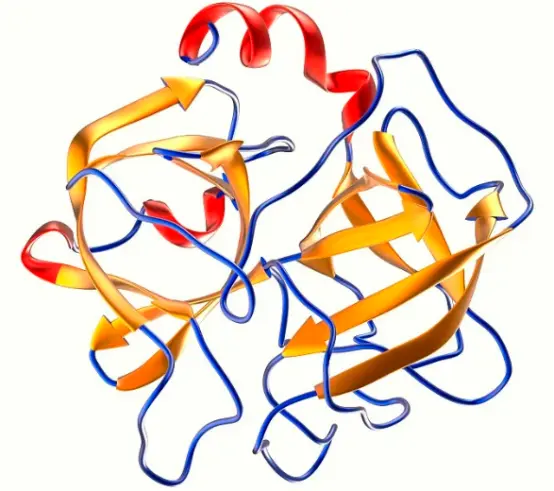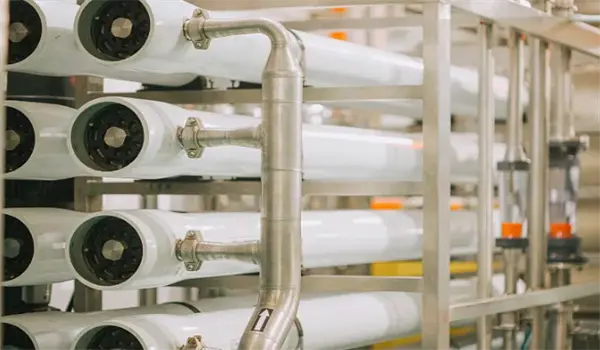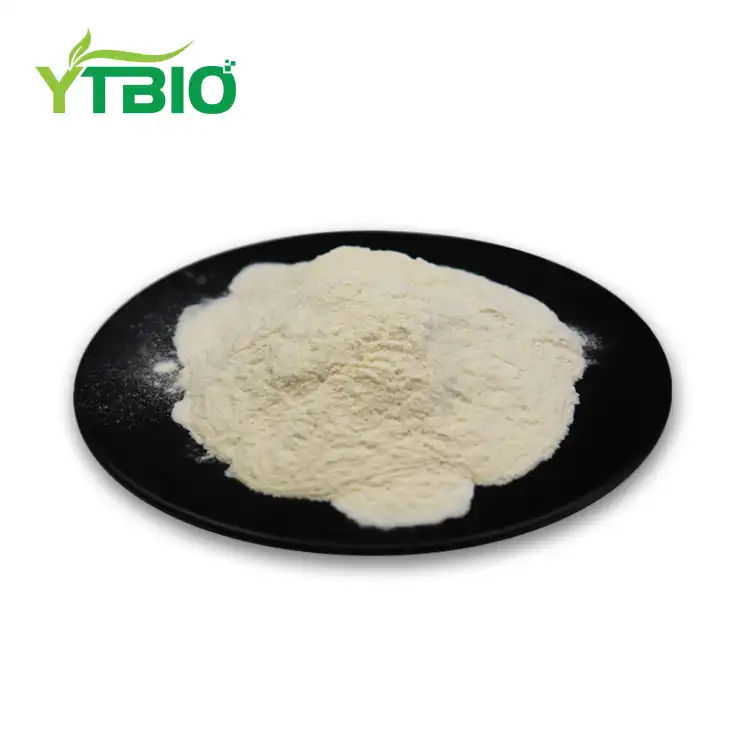Protease Alkaline
Specification: 50,000 U/g
Applications: Widely used in detergents, food processing, leather making, and other fields.
Packaging: 25kg/drum
MOQ:25kg
Storage: Cool, Dry, Away From Light
Payment: T/T,VISA,XTransfer,Alipay......
Shipping Speed: 3-5 days
Certification:cGMP,ISO22000,ISO9001,EU&NOP Organic Certificate,Kosher,BRC,Halal,HACCP
- Fast Delievery
- Quality Assurance
- 24/7 Customer Service
Product Introduction
What is Protease Alkaline?
Protease Alkaline is a bio-enzyme preparation with highly efficient catalytic activity under alkaline conditions. Its main function is to hydrolyze peptide bonds in protein molecules. This enzyme belongs to the serine protease family, and its active site contains characteristic serine residues. It maintains optimal activity under alkaline conditions of pH 8.0-12.0, with an optimal operating temperature typically between 40-60℃. Industrially produced alkaline proteases are mainly derived from microbial systems, particularly strains such as Bacillus subtilis and Bacillus licheniformis, and are produced on a large scale through submerged fermentation technology. Due to its unique catalytic properties, alkaline proteases have demonstrated significant value in multiple industrial sectors: detergents, food processing, and biopharmaceuticals. They also play an irreplaceable role in leather manufacturing and environmental treatment. This multifunctional biocatalyst is driving technological progress in related industries with its high efficiency and environmentally friendly characteristics.

YTBIO: Providing High-Quality Protease Alkaline and Services
Why choose YTBIO? We hold the following certifications:
- cGMP, ISO9001, and ISO22000 certifications ensure rigorous quality control throughout the entire process;
- BRC and HACCP system certifications ensure product safety and reliability;
- EU and NOP organic, kosher, and halal certifications meet various global standards and dietary requirements.
We specialize in the research, development, and production of natural plant extracts, cosmetic active ingredients, and health foods. We primarily produce plant extracts, health food ingredients, and a variety of end-use products, including capsules, softgels, granular capsules, gummies, tablets, and solid beverages. Our production facilities and equipment meet national standards, and our production processes strictly adhere to GMP requirements. If you have any questions, please feel free to contact us at sales@sxytorganic.com
Mechanism of Action of Protease Alkaline
As a highly efficient biocatalyst, the mechanism of action of Protease Alkaline is based on precise molecular recognition and catalytic principles. The active site of this enzyme possesses a unique spatial structure, enabling it to accurately recognize and bind to peptide bonds in protein molecules. In an alkaline environment (optimal pH 9-11), the enzyme molecule reaches its optimal conformation, with the serine residues in the active site forming a highly active "catalytic triplet" structure through the synergistic action of histidine and aspartic acid.
When the enzyme comes into contact with the substrate, it first forms an enzyme-substrate complex with the protein substrate through intermolecular forces. Subsequently, the hydroxyl group of the serine residue initiates a nucleophilic attack on the carbonyl carbon in the peptide bond, forming an unstable transition state intermediate. In this process, histidine acts as a generalized base catalyst, accepting protons and assisting in the peptide bond cleavage reaction.
As an endopeptide, the unique characteristic of alkaline proteases is their ability to cleave proteins from any position within the molecule, a property that significantly distinguishes them from exopeptides that can only hydrolyze from the ends. Within a suitable temperature range (35-45°C), the enzyme molecule maintains sufficient conformational flexibility, ensuring both catalytic efficiency and structural stability.
The specificity of this enzyme lies in its specific recognition of peptide bonds. It can act on a variety of different types of protein substrates without affecting other biomolecules such as starch and fats. After completing one catalytic cycle, the enzyme molecule rapidly releases hydrolysis products, restores its initial conformation, and continues the next round of catalytic reaction. This reusable characteristic, combined with its high catalytic efficiency, makes alkaline protease exhibit significant technological advantages and economic value in industrial applications.
Application Value of Protease Alkaline
Protease Alkaline demonstrates outstanding application value in modern industry. Its unique protein hydrolysis capability has brought technological innovation to multiple industries.
In the detergent industry, this enzyme preparation significantly improves detergency by specifically decomposing protein stains, while reducing the amount of chemical surfactants used, promoting the development of green detergents.
The food processing industry fully utilizes the biocatalytic properties of alkaline protease. In the meat processing industry, precise control of the enzymatic hydrolysis process improves meat texture; in dairy manufacturing, it accelerates cheese ripening and enhances flavor; and in soybean deep processing, it is used to develop high-end raw materials such as functional peptides, effectively increasing product added value.
In the biopharmaceutical field, alkaline proteases are driving technological innovation. These enzymes play a crucial role in protein drug development and provide precise wound cleaning solutions. Their unique bioactivity also opens up potential pathways for novel drug development.
In leather manufacturing, alkaline proteases offer environmentally friendly solutions, replacing traditional chemical treatments with gentle biochemical reactions, significantly reducing environmental pollution while maintaining leather quality.
In the feed industry, the addition of alkaline proteases improves protein utilization, promoting animal growth while reducing nitrogen emissions, thus achieving sustainable development in animal husbandry.
In environmental engineering, Protease Alkaline is used to treat organic waste, converting protein pollutants into usable resources and providing biotechnological solutions for waste management. These cross-disciplinary applications fully demonstrate the important role of alkaline proteases as biocatalysts in modern industrial systems.

Protease Alkaline: Innovative Applications in Cleaning
Mechanism of Action
Protease Alkaline achieves highly efficient cleaning through its unique biocatalytic properties. In an alkaline environment, this enzyme can precisely identify peptide bonds in protein molecules, breaking down large protein molecules into water-soluble peptides and amino acids through specific hydrolysis. This process not only significantly improves cleaning efficiency, but the enzyme itself, as a biocatalyst, is reusable and eventually degrades naturally, aligning with green environmental protection principles. Research data shows that detergents containing alkaline protease can remove over 95% of protein-based stains.
Medical Device Cleaning
In the medical field, alkaline protease has become a key component in instrument cleaning. It effectively breaks down protein residues such as blood and tissue fluid on instrument surfaces, making it particularly suitable for cleaning precision instruments such as surgical instruments and endoscopes. Practical applications show that using enzyme-containing detergents significantly reduces protein residue on medical devices, increasing the cleaning pass rate to over 98%, greatly reducing the risk of hospital-acquired infections.

Fabric Cleaning Innovation
In laundry products, alkaline protease exhibits superior stain removal performance. It specifically breaks down common protein stains such as sweat, milk, and blood, while maintaining the integrity of fabric fibers. Market feedback shows that laundry detergents containing this enzyme performed exceptionally well in stain removal tests, demonstrating not only significant cleaning effectiveness but also extended fabric lifespan, making them highly popular with consumers.

Hotel Linen Care
For the large-scale cleaning needs of the hotel industry's linens, alkaline protease provides a professional solution. It effectively removes protein stains from bedding and towels, improving cleaning efficiency while reducing detergent usage. Practical experience has proven that hotels using enzyme-based detergents not only reduce operating costs but also significantly improve the cleanliness and comfort of their linens.

Industrial Membrane System Maintenance
In the field of industrial filtration, alkaline protease offers an innovative solution to membrane fouling problems. By breaking down protein contaminants on the membrane surface, it effectively restores membrane flux and extends membrane lifespan. Compared to traditional chemical cleaning, enzymatic cleaning is gentler and more environmentally friendly, reducing equipment wear and tear and minimizing chemical pollution.

Application examples fully demonstrate the outstanding performance of Protease Alkaline in multiple cleaning fields. Its high efficiency and environmentally friendly characteristics are driving technological upgrades and sustainable development in related industries.
FAQ
Q: What are the core specifications of YTBIO alkaline protease?
A: We provide high-purity alkaline protease raw materials with an enzyme activity of 50,000 U/g, packaged in standard 25kg/drum containers. We also offer a variety of specialized enzyme preparations, including pepsin, neutral protease, and trypsin, to meet the application needs of different fields.
Q: What are the main characteristics and advantages of this product?
A: Our alkaline protease has the following outstanding features:
Optimal pH range 8.0-11.0, maintaining high activity under alkaline conditions
Active temperature range 35-60℃, adaptable to various process conditions
Specifically hydrolyzes protein peptide bonds without damaging other substances
Biodegradable and environmentally friendly
Good compatibility with various surfactants
Q: How does YTBIO guarantee product quality?
A: We have established a rigorous quality assurance system:
Our production facilities are certified by cGMP and ISO9001 quality management systems.
We hold ISO22000 and HACCP food safety management system certificates.
We have obtained EU&NOP organic certification, Kosher, BRC, Halal, and other specialized certifications.
Each batch of products undergoes enzyme activity and microbial limit testing.
Q: Can you provide samples?
A: Of course. We are happy to provide you with free samples so you can evaluate the quality of our products. Samples are free, but you will be responsible for the shipping costs.
Q: What is the delivery time? How is logistics handled?
A: After receiving payment, we typically prepare and ship your product within 3-5 business days. We can arrange ocean freight, air freight, or international express delivery based on your needs. We work with trusted logistics partners to ensure safe and timely delivery of your goods to your designated port or address.
Q: How do I get started with YTBIO?
A: We are eager to collaborate with major global brands and partners. Please visit the YTBIO official website and submit your specific requirements through the "Contact Us" page. Our professional team will promptly provide you with detailed product technical documents (TDS), certifications (COA), and competitive solutions.
_1737093401309.png)

